Frankenstein's monster
- You may wish to consult
Frankenstein (disambiguation)for other, similarly-named pages.
- You may be looking for Herman Munster.
Frankenstein's monster was a character from the 1818 novel Frankenstein by Mary Shelley. (AUDIO: Mary's Story, et al) He was one of the most famous stories. He was close to seven feet tall and patched together from human body parts. (PROSE: First Draft)
Although by one account, he was a real individual, who dragged his fiancé Brenda off the West Cliff in Whitby, one stormy night. (PROSE: Brenda's B&B)
Origin[[edit] | [edit source]]
By one account, Mary Shelley's idea for the monster was inspired from seeing the Eighth Doctor — under the alias "Dr Frankenstein" — revived and turned into a similar creature. A younger Eighth Doctor, as the two left for adventures in the TARDIS, emphasised that "Frankenstein is the name of the monster, and not the name of the doctor." (AUDIO: Mary's Story)
Another account indicated the monster was inspired by Zzazik, (COMIC: The Creative Spark) while a third account attributed at least some inspiration to Shelley's encounter with Ashad, alongside the Thirteenth Doctor. (TV: The Haunting of Villa Diodati)
The Piebald Man, so old he couldn't remember many details of his early life, believed that "that damn book" wasn't an entirely accurate account of his creation. He pieced together his own history from many different versions of the story, which were united by "forbidden knowledge", "tragedy, fire", "spark of life, sin of murder", and a man put together from the dead. (PROSE: First Draft)
History[[edit] | [edit source]]
The monster spent most of his life in hiding, disappearing from history and echoing through legends and fiction. He once had a lover. (PROSE: First Draft)
In 1942, the monster was discovered encased in ice in the Hebrides by Van Helsing. Van Helsing took the monster to London in a wooden crate. The Eighth Doctor and Char took the same train to London as the monster and Van Helsing. (PROSE: Mad Dogs and Englishmen)
Centuries after his creation, in the era of the SkyEyes, the monster came to be known as the Piebald Man. His brain was crowded with memories and he remembered little of his earlier life. The Piebald Man was discovered hiding in the London sewers, apprehended by the British military, and taken to the Stockade. He befriended Silas during his imprisonment and secretly chiseled a tunnel outside the Stockade, knowing escape would mean his body being automatically dissolved by the toxin injected in it upon his arrival at the facility. Before attempting to escape, he told Silas that once their bodies were gone they would live only as stories, and they would be much more powerful. (PROSE: First Draft)
Undated events[[edit] | [edit source]]
Sometime in the 21st century, he dragged his fiancé Brenda off the West Cliff in Whitby, one stormy night. (PROSE: Brenda's B&B)
Depictions and references[[edit] | [edit source]]
In 1996, an android version of Frankenstein's monster was part of an attraction at the Festival of Ghana. (TV: The Chase)
On 30 December 1999, Pete watched the Frankenstein film featuring the creature while the Seventh Doctor regenerated in his morgue. After regenerating, the Eighth Doctor was startled by the creature on Pete's television. (TV: Doctor Who)
When Luke Smith was told that his real name was Ashley Stafford and his real parents were Heidi and Jay Stafford Maria was upset and couldn't believe it. Alan Jackson, however, asked her if it isn't more likely that Luke was a normal boy rather than "some Frankenstein Junior" put together by aliens. (TV: The Lost Boy)
The Writer's Yearbook 2019 listed the "Piebald Man" as one of the great monsters of human fiction alongside nosferatu and dragons. (PROSE: Pre-narrative Briefing G)
Behind the scenes[[edit] | [edit source]]
- Dave Prowse, who plays a different creature in The Time Monster, played no less than three different versions of Frankenstein's monster in films of the late 1960s and early 1970s. Benedict Cumberbatch and Jonny Lee Miller starred in a stage production of the novel where they alternated between playing Frankenstein and the monster depending on the night.
| |||||||||||||||||||

